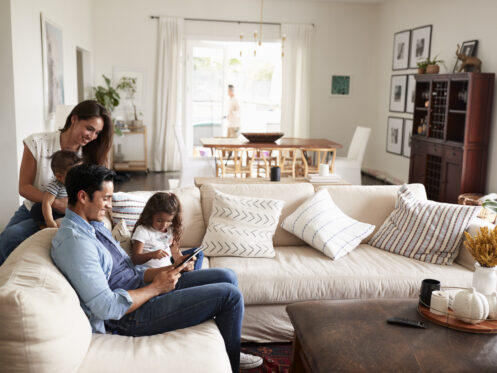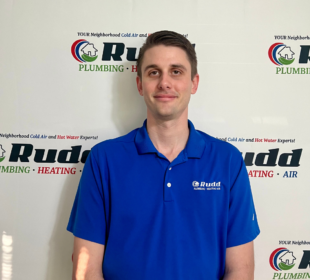While the Southern U.S. enjoys milder winters compared to other regions, homeowners still face unique challenges in maintaining energy efficiency. Even without harsh cold fronts or heavy snowfall, fluctuations in temperature, especially during chilly nights or cold snaps, can lead to higher energy consumption and increased utility bills.
Here’s what you need to know to maximize heating efficiency and save money during Southern winters.
Check Your Insulation
Heating efficiency begins with keeping warm air inside during periods of cool or cold weather. Your first line of defense when it comes to heat loss is insulation, so make sure yours is up to par, especially in often overlooked areas such as the attic and crawlspaces or basements.
Doors and windows are also common culprits when it comes to heat loss. Even small drafts can allow warm air to escape, making your heating system work harder and increasing energy costs. Checking for gaps around door frames and windows is essential to identify potential issues. The U.S. Department of Energy suggests sealing these gaps can improve energy efficiency by up to 30%.
Replacing or upgrading old, single-pane windows with double-paned options is another effective way to enhance your home’s insulation. Double-pane windows consist of two layers of glass with a sealed air gap between them. This air gap acts as insulation, reducing heat transfer between the interior of your home and the outside environment.
Optimize Your Thermostat Settings
Programmable thermostats are valuable tools for managing temperature changes efficiently, especially in regions with mild winters. They allow you to customize heating schedules to match your household’s routine, ensuring your heating system only comes on when necessary. For example, you can lower the temperature at night while everyone is asleep or during the day when the house is empty. This simple adjustment can significantly reduce energy consumption and lower monthly utility bills.
Program the thermostat to warm your house before you wake up or return home to maximize comfort. If you have a zoned heating system, consider focusing on the areas of the home you use most often, such as the living room during the day or bedrooms at night. You can lower the temperature in spaces like guest rooms, which may only be used occasionally.
Maintain Your Heating System
No matter which type of heating system you rely on, regular maintenance is essential to ensure that it performs at peak efficiency. Even in mild climates, neglecting routine upkeep can lead to inefficiencies, resulting in higher energy costs.
Key maintenance tasks include changing out HVAC filters when necessary. This is because dirty or clogged filters may cause your system to work harder to do its job. Experts recommend replacing filters at least every three months.
However, you may have to change yours more often based on factors like if you have pets and how many people live in your household. Activity during the holidays, such as having guests over, can also increase how often your filter needs to be changed. Many homeowners inspect their HVAC filters once a month to ensure they know when they need attention.
Another thing you can do to keep your heating system working efficiently is to ensure that no household items are blocking your return and supply vents. Curtains, furniture, and area rugs can obstruct airflow and, like a dirty filter, force your system to work harder to maintain a consistent temperature.
Airflow obstructions can also lead to uneven heating and increased wear on your HVAC system. Keeping 12 inches of clearance around vents allows warm air to circulate freely, ensuring your home stays comfortable and your system operates as it should.
In addition, including professional tune-ups in your maintenance plan means that emerging issues with your heating system will be caught and fixed early. A professional will also clean your heater’s internal components, such as the burners and heat exchanger. They will also check for potential safety hazards, like carbon monoxide leaks or faulty wiring, ensuring your heating system operates safely and reliably throughout the winter. Most experts recommend professional maintenance once a year, preferably in the fall, to ensure your system is ready for winter.
Harness Natural Heat Sources
Make the most of the mild southern climate by using natural heat sources to reduce reliance on your heating system. During the day, open drapes and curtains on south-facing windows to let sunlight flood into your home.
It is a free and effective way to raise indoor temperatures. As evening approaches, close the curtains to retain the heat and prevent drafts in your living spaces. For even better results, consider investing in thermal or insulated curtains. These specialized window coverings add an extra layer of insulation, helping to keep your home warmer during chilly evenings and cloudy days.
Upgrade Your Heating System
Outdated heating systems often struggle to meet household demands, leading to inefficiencies and higher energy costs. Upgrading to a modern system can dramatically improve both energy efficiency and reduce your home’s carbon footprint.
Heat pumps are one of the best upgrade options for households in mild climates. Unlike traditional systems, heat pumps transfer heat rather than generate it in the winter, making them exceptionally efficient in areas with moderate outdoor temperatures. They are also as efficient as modern air conditioners when in cooling mode and eliminate the need to maintain two separate systems.
Another excellent choice is a high-efficiency furnace, particularly for those who prefer a more traditional heating system. Look for ENERGY STAR-certified models that meet strict energy-saving criteria and offer the best long-term cost savings.
Upgrading your heating system isn’t just about comfort and efficiency; it can also save you money over time. Energy-efficient systems often pay for themselves through lower utility bills. Additionally, many state and federal programs offer tax credits or rebates to homeowners who install qualifying energy-efficient heating systems, reducing the upfront cost of a new system.
Reduce Energy Use with Smart Technology
Smart home technology allows homeowners to optimize energy use, enhance convenience, and maintain greater control over household systems. For example, advanced smart thermostats can learn your family’s daily routine and automatically adjust the temperature based on your habits. This eliminates the hassle of manually programming your thermostat.
Many smart thermostat systems also have user-friendly apps that provide detailed energy reports. These reports often include insights into your household’s energy consumption patterns, comparisons with past usage, and tips for further reducing energy costs. Reviewing these analytics allows you to make adjustments aligning with your comfort and sustainability goals.
Contact Your Local Professionals
At Rudd Plumbing, Heating, Air, and Electrical, we have been serving the residents of Moncks Corner, SC, and the surrounding areas since 2014. We install, maintain, and repair heating and cooling systems. We can also help with all your plumbing needs, including drain cleaning, water softener installation, and sewer repair. And it doesn’t end there! Ask us about our pre purchase home inspections!
Contact us today to schedule a heating tune-up with one of our experienced technicians.

